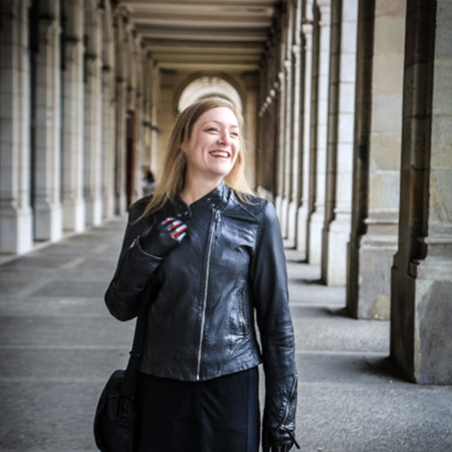Elizabeth Scarratt
Director, Institutional Programs Division, Research Services, University of Calgary
Bachelor of Science, 1999
I am a huge geek. I love science. I love research.
A twenty million dollar University of Calgary project was on the line. The ship carrying the equipment, an incoherent scatter radar, was in California. It had to get to Resolute, Nunavut before winter ice started to build in the Northwest Passage. The risk was high, the logistics complicated, and the window of opportunity was closing.
“It would have delayed the project for another year,” Liz Scarratt says. But she and her team at the University of Calgary pulled it off and now world class research into the northern lights is taking place in one of Canada’s most northerly communities.
That sort of logistics wrangling is just a small part of Liz’s job. As Director of the University’s Institutional Programs Division, Research Services Liz is intimately involved with almost all aspects of major university research projects. From that radar in Resolute to the International Microbiome Centre (a world class facility in Calgary for studying the bugs in our gut) to ACWA (Advancing Canadian Wastewater Assets), a partnership between the University and the City of Calgary devoted to ensuring a clean water supply.
“It’s a strange position to be in,” Liz says. “I have to be a generalist to do my job well. I don’t have a PhD. I haven’t specialized. But I am a huge geek. I love science. I love research. I love learning about each new thing. In any one day I have meetings on maybe five different topics. Some of them I may know nothing about.”
Liz isn’t alone in this work. In 2011 she established a multidisciplinary panel called SUPPORT. Experts and non-experts alike, in any given field, review the proposals, helping the researchers build the narrative of their dream projects.
“I’ll ask why is this exciting research? Then I’ll use that information so that the reviewers and the government can get excited about it. And that can be difficult for a research group because they are so close to it.”
“It’s very Kingsian,” she says about the process of getting to the very heart of the importance and value of the project. “I credit the Foundation Year Program (FYP) for many of the things I do.”
And it has paid off, bringing in millions of dollars for research equipment and close to doubling the success rate of grant applications. Liz and her team currently have more than a hundred projects on the go involving seven hundred researchers.
Liz is becoming known off-campus for her work as well. She was named one of the Top 40 Under 40 (2017) in Calgary, a list of young people who have achieved success and helped the city develop. The strange thing for Liz is that while others put her name forward, she had to fill out the nomination form herself.
“It was pretty uncomfortable for me. I’m a behind the scenes person. But I got such a warm response from my colleagues.”
As nice as that was, Liz says what is really important is advancing the research of the experts she works with.
“I’m really lucky to get to do what I do. It’s rewarding for me. I feel like I am contributing to something better. You can go to work every day and put in the hours and that’s it. But I’ve never been that way. I’ve always thrown myself into everything. I get so excited when we have a success.”
Posted: Jan. 2018
